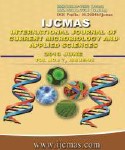


 National Academy of Agricultural Sciences (NAAS)
National Academy of Agricultural Sciences (NAAS)

|
PRINT ISSN : 2319-7692
Online ISSN : 2319-7706 Issues : 12 per year Publisher : Excellent Publishers Email : editorijcmas@gmail.com / submit@ijcmas.com Editor-in-chief: Dr.M.Prakash Index Copernicus ICV 2018: 95.39 NAAS RATING 2020: 5.38 |
The present investigation was carried out on Non-preference / Antixenosis and antibiosis mechanism contributing to BPH resistance in certain identified elite rice genotypes. Antixenosis mechanism of resistance was assessed through studies on Honey dew excretion test and fecundity test. Among all the test entries with moderate resistance, Sabita recorded lowest honeydew excreted area of 37.33 mm2 and followed by KNM 2307, KNM 2305 and PTB 33 registered significantly lower honeydew excretion (40.33, 44.33 and 50.33 mm2/ 5 females, respectively). Minimum number of eggs/female were laid on three rice genotypes viz., KNM 2305 (39.33) and RNR 25838 (41.00). All the selected rice genotypes showed significantly lower total eggs/female compared to the susceptible check TN1 (159.33). Lowest hatchability was observed in KNM 2305 (54.61%) followed by PTB33 (57.74%) and KNM 2307 (58.46%) than all other test cultures.
 |
 |
 |
 |
 |